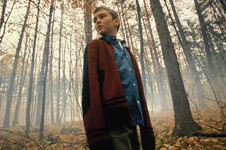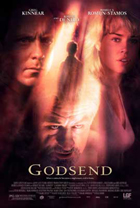Godsend
|  “This is for Adam,” the mother says. “Sometimes, ethics have to take a backseat.” And that’s exactly what happens in Godsend, a silly thriller about cloning, although when she says this line, she’s referring only to her husband’s reluctance to relocate from the inner-city high school at which he teaches to a nice, suburban school that will pay him twice as much. “I’d feel like I’m selling out,” he says. Not to worry: The movie does all the selling out for him. “This is for Adam,” the mother says. “Sometimes, ethics have to take a backseat.” And that’s exactly what happens in Godsend, a silly thriller about cloning, although when she says this line, she’s referring only to her husband’s reluctance to relocate from the inner-city high school at which he teaches to a nice, suburban school that will pay him twice as much. “I’d feel like I’m selling out,” he says. Not to worry: The movie does all the selling out for him.Greg Kinnear and Rebecca Romijn-Stamos star as the attractive, happily married couple, Paul and Jessie Duncan. After their beaming and beloved eight-year-old son, Adam (Cameron Bright), is killed in a tragic accident, they are approached by Dr. Richard Wells (Robert De Niro), a millionaire scientist/doctor who has perfected a cloning technique and has been waiting for the perfect opportunity to try it out. Paul and Jessie decide to go through with the cloning, although any of the real emotional implications of replicating their dead son gene for gene are pretty much swept under the rug by screenwriter Mark Bomback. As the cloning of a human being is completely illegal, Paul and Jessie must cut off all ties to their friends and family (don’t want anyone asking questions about where Adam #2 came from) and move from New York City to a rural area in Vermont where Dr. Wells’ sprawling Godsend Institute is located. Adam #2 is born without any problems, but when he grows up to age eight, the age at which his predecessor died, Bomback’s script goes from trite to increasingly ludicrous. The new Adam begins having awful night terrors that Dr. Wells tries to explain away with child psychology, but Paul fears are somehow the memories of his former self that were encoded into his DNA coming to the surface. It’s more complicated than that, and the big twist isn’t too hard to figure out long before Paul finally unearths the truth, but no matter. None of it is compelling in the least because it’s readily apparent that all aspects of the plot serve no real function other than to create “creepy kid” scenes. The idea of creepy kids is an old one in the horror genre, and it has been used to varying degrees of effect in such films as Village of the Damned (1960), The Omen (1976), The Good Son (1991), and even The Sixth Sense (1999). Creepy kids are effective because they illustrate so well Freud’s sense of the uncanny—something that is both familiar and alien at the same time. Particularly in Western culture, where children are thought of as cute and innocent and constantly in need of protection, the idea that one might be genuinely evil is deeply troubling. Thus, when Adam #2 starts acting weird, director Nick Hamm clearly intends it to be a disturbing turn of events. However, the problem is that this change doesn’t carry much emotional weight because we never got to know Adam #1 very well, thus he doesn’t seem particularly connected to his cloned counterpart (the fact that they have completely different haircuts almost makes them look like different kids altogether). Adam #2 is never anything but creepy and distant, and said creepiness ends up playing as didactic punishment against his parents, who dared toy with nature. Unfortunately, the film isn’t satisfied with that, either, and in the final stretches it begins to warble, basically trying to make Adam both a victim and a victimizer. It’s as if the filmmakers were unwilling to fully commit to the idea of an evil child, so we get a series of false endings and then a final scene that feels so tonally uneven that you might suspect it was culled together at the last minute from outtakes. Director Nick Hamm, a former director of the Royal Shakespeare company, has directed horror before, 2001’s The Hole, which starred Thora Birch and Keira Knightly and has developed something of a cult following. He certainly has a strong visual style, and he frequently makes Godsend more suspenseful and harrowing than it has any right to be. Unfortunately, he is hampered by an inane screenplay that doesn’t want to deal with any of the issues it brings up, and as a result it staggers awkwardly from melodrama to horror and back to melodrama again. There’s a good story waiting to be told about parents who dare to clone their dead child—one that truly gets at the heart of what such a desperate action would entail—but Godsend isn’t it. Copyright ©2004 James Kendrick All images copyright ©2004 Lions Gate Films Inc. |
Overall Rating: 
 (1.5)
(1.5)


